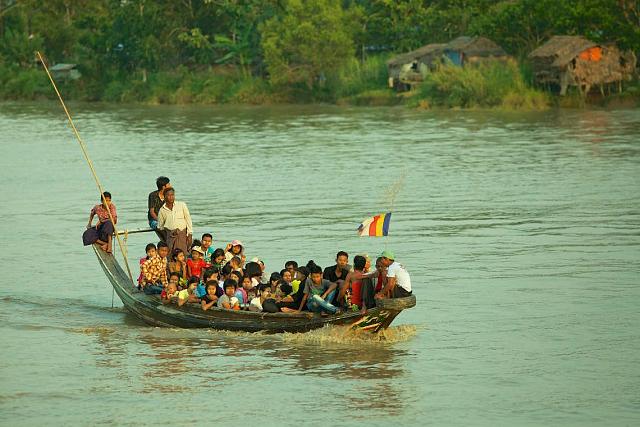Omicron travel bans on Africa: “The history of racism, inequalities and discrimination is interwoven with the science”


Omicron travel bans on Africa: “The history of racism, inequalities and discrimination is interwoven with the science”

At COP-26, Indigenous representatives from across the world went to Glasgow to raise their voices, and try to influence the decisions that would shape the future of our planet. Despite their clear calls for a future in which fossil fuels are left in the ground, local ownership of land and (…)

"Democracies Under Pressure. Authoritarianism, Repression, Struggles"
You can watch here the roundtable discussing the latest issue of Passerelle Collection Democracies Under Pressure. Authoritarianism, Repression, Struggles, which was held online on Wednesday, May 19th 2021 on ritimo’s PeerTube account.
This article examines how refugees displaced from Myanmar in Mae Sot city on the Thailand-Myanmar border use various types of identification documents as a tool to extend their rights, including the right to citizenship, the right to work and the right to education.
Vidéo
Keynote speech at World Social Forum on Labor Migration, Miriam College, Quezon City, Philippines, Nov 26, 2012
I would like, first of all, to congratulate the Migrant Forum of Asia, the Center of Migrant Advocacy, and all other organizations that have put together this historic World Social (…)
Neoliberalism is in crisis but still dominating. Position concerning neoliberalism plays a major political role. We could confirm it recently in all countries of Maghreb and Machrek. After 2011, the new cycle of struggles and revolutions has offered and is still offering great hopes. They (…)
Bonne pêche, mauvaise pêche
Les pêcheurs se sentent désormais dévalorisés dans leurs savoirs du fait de l’introduction des nouvelles techniques (chalut, sonar, GPS). Rares sont les pêcheurs qui encouragent leurs enfants à travailler dans la pêche. Quand leurs revenus s’améliorent, ils incitent leurs enfants à étudier. Le (…)
Résumé en français : Dans cette déclaration à l’occasion de la Conférence mondiale des télécommunications internationales qui s’est tenue à Dubaï du 3 au 14 décembre 2012, l’AMARC rappelle que "la radio doit d’être d’accès universel, gratuit et anonyme, et que l’accès au spectre pour les radios (…)
Quatre choses à savoir sur la catastrophe nucléaire de Fukushima
Dissimulation de défauts de conception et de production dans certaines parties des réacteurs de Fukushima, nombre de personnes évacuées vivant toujours - deux ans plus tard - en logement temporaire, fabricants des réacteurs qui font maintenant des bénéfices en nettoyant la catastrophe qu’ils ont (…)
Le monde de la géo-ingénierie
ETC Group publie une carte du monde de la géo-ingénierie - un ensemble de technologies expérimentales qui visent à modifier intentionnellement le climat à l’échelle globale et régionale. Cette carte documente près de 300 projets de géo-ingénierie, des recherches et expérimentations à l’échelle (…)
Le Forum Social des Peuples (Canada, 2014)
Résumé en français : Retour sur l’énorme succès du premier rassemblement pour l’organisation du Forum social des Peuples du Canada qui aura lieu en 2014. Ce weekend préparatoire s’est tenu les 26 et 27 janvier à l’Université d’Ottawa et réunissait des représentants de la société civile (…)
Les deux Soudans : Un tour de voisinage
Résumé en français : Avant l’indépendance du Sud-Soudan en juillet 2011, le Soudan était le plus grand pays d’Afrique, et partageait une frontière avec neuf pays.
Aujourd’hui, les deux Soudans sont au cœur d’une région au contexte géopolitique compliqué où se rejoignent le Sahara, le Sahel, la (…)
Cartographier les Communs d’Athènes et Istanbul
Face aux politiques néolibérales, quel rôle les Communs peuvent-ils jouer ? Des citoyens en Grèce d’abord puis à Istanbul ont décidé d’explorer cette question en cartographiant les Communs. Les cartes en ligne et les vidéos rendent visibles les expériences qui soutiennent la vie quotidienne des (…)
La Cour suprême philippine suspend la loi sur le "cybercrime"
Des milliers de citoyens et journalistes à travers le monde se sont mobilisés contre la nouvelle loi votée aux Philippines sur le "cybercrime" qu’ils considèrent comme une porte ouverte au "cyber-autoritarisme". Ils craignent que cette loi qui légalise la surveillance des posts sur facebook, des (…)
Les biotechnologies agricoles devraient être ’open source’
Résumé en français : Pour certains scientifiques, l’intégration des principes de l’accès libre aux biotechnologies agricoles pourrait procurer d’énormes avantages aux pays en développement.
[NEW DELHI] Open source biotechnology, through which biotechnology inventions are made freely available (…)
Le coût exhorbitant du développement
Cet article rend compte de l’ouvrage ’Communities, Commons and Corporations" édité par Perspectives, une organisation non-gouvernementale d’étudiants et chercheurs de l’université de Delhi. Leur objectif est de "rendre compte de la vie et des luttes des populations qui se situent à la marge de (…)
Le Sri Lanka se relève de ses ruines
Résumé en français : Trois ans après la fin de la guerre, la réconciliation demeure un rêve lointain alors que le gouvernement sri lankais et l’Alliance nationale tamoule campent respectivement sur leurs positions. Pendant ce temps, les habitants ordinaires de la minorité tamoule se battent pour (…)
Etat des lieux du numérique en Europe
Pesant le pour et le contre grâce à de nombreuses contributions, ce rapport de l’Open Society Media Program sur l’impact de l’explosion du numérique sur la démocratie soutient que l’accès à l’information est davantage garanti par les médias des services publics.
Outlining the pros and cons of (…)
Migration en Inde : une nouvelle réalité
En Inde, de plus en plus de conflits sociaux, politiques ou économiques sont centrés autour des questions de migration. Les tensions sociales et l’instabilité en Assam, liées aux perceptions des différences générées par les migrations passées, ont trouvé un écho inquiétant dans la circulation (…)